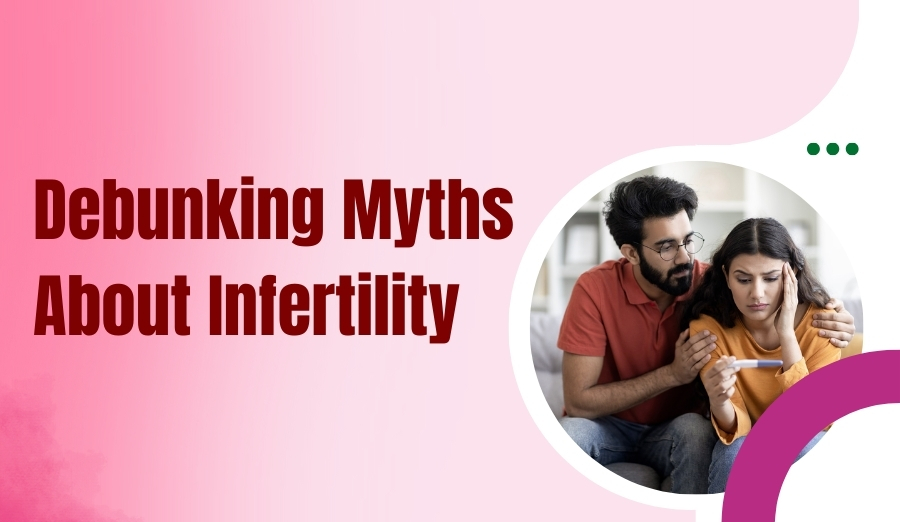-
Ganesh Talkies, Kolkata
Ganesh Talkies, Kolkata

Hello Reader!
Welcome to the blog page of Dr. Megha Khanna, one of the best obstetrician in Kolkata.
Infertility is a subject surrounded by numerous misconceptions and myths, causing unnecessary stress and confusion for many couples. As the best gynaecologist in Kolkata, I have encountered countless patients struggling with infertility, often influenced by misinformation. In this blog, we will explore and debunk some of the most common myths about infertility to provide clarity and reassurance.

One of the most persistent myths about infertility is that it is solely a female issue. In reality, infertility affects both men and women equally. According to medical research, about 40% of infertility cases are due to female factors, 40% to male factors, and the remaining 20% are due to unexplained or combined causes. If conception is taking longer than expected, both partners should undergo medical evaluation.
While it is true that fertility declines with age, many believe that women remain highly fertile until their 40s. However, female fertility starts to decline significantly after the age of 30, with a sharper drop after 35. The quality and quantity of eggs diminish over time, making conception more challenging. It is crucial to consult with the best fertility specialist in Kolkata early on if planning for a family later in life.
Many people assume that if they have previously conceived, infertility cannot affect them. However, secondary infertility—the inability to conceive after having one or more children—is quite common. Various factors such as age, lifestyle changes, hormonal imbalances, and medical conditions can contribute to secondary infertility. Consulting a specialist is necessary to determine the underlying cause and seek appropriate treatment.
Stress is often blamed as the primary cause of infertility. While chronic stress can impact hormone levels and menstrual cycles, it is rarely the sole cause of infertility. Other medical factors such as ovulation disorders, blocked fallopian tubes, endometriosis, or low sperm count are more likely contributors. Seeking guidance from the best women’s health specialist in Kolkata can help identify the exact cause and recommend effective treatments.

Another widespread misconception is that In-Vitro Fertilization (IVF) is the only solution for infertility. While IVF is a highly effective treatment, many cases of infertility can be managed with lifestyle modifications, medication, ovulation induction, or minor surgical procedures. A thorough diagnosis by a qualified specialist can determine the best course of action.
While regular intercourse is essential for conception, simply increasing its frequency does not guarantee pregnancy. Timing plays a crucial role—understanding ovulation cycles and identifying the most fertile days is key. Consulting an expert can help couples optimize their chances of conception naturally.
Many women fear that long-term use of birth control pills will lead to infertility. However, once a woman stops taking contraceptive pills, her fertility typically returns to normal within a few months. If pregnancy does not occur after a reasonable time, other factors may be at play, and consulting the best reproductive endocrinologist in Kolkata can provide clarity.

Yes, lifestyle changes can significantly improve fertility for both men and women. Here are some key insights based on recent research and expert recommendations:
A nutritious diet plays a crucial role in enhancing fertility. Studies have shown that diets rich in fruits, vegetables, whole grains, and healthy fats can positively impact reproductive health. Specifically, adherence to a “fertility diet” similar to the Mediterranean diet—which emphasizes seafood, poultry, and low-pesticide produce—has been associated with improved fertility outcomes. For women, consuming full-fat dairy products may lower the risk of ovulatory dysfunction, while men benefit from diets that include omega-3 fatty acids to improve sperm quality.
Both obesity and being underweight can adversely affect fertility. Excess body weight is linked to hormonal imbalances that can disrupt ovulation in women and reduce sperm quality in men. Achieving and maintaining a healthy body mass index (BMI) through balanced nutrition and regular physical activity can enhance fertility prospects.
Moderate exercise is beneficial for fertility, as it helps regulate hormones and maintain a healthy weight. Engaging in regular physical activity can reduce the risk of infertility and improve overall reproductive health. However, extreme exercise or excessive physical activity can have the opposite effect, potentially leading to menstrual irregularities in women and decreased sperm production in men.
Eliminating smoking, reducing alcohol intake, and avoiding recreational drugs are critical lifestyle changes that can enhance fertility. Smoking has been shown to negatively impact egg quality in women and sperm quality in men. Similarly, excessive alcohol consumption can lead to hormonal imbalances that affect reproductive health.
High levels of stress can interfere with hormonal balance and ovulation, making stress management an essential aspect of improving fertility. Techniques such as mindfulness, yoga, meditation, or counseling can help couples cope with the emotional challenges of trying to conceive.
Excessive caffeine consumption has been linked to fertility issues in some studies. While moderate caffeine intake is generally considered safe, limiting caffeine to about 200 mg per day (approximately one 12-ounce cup of coffee) may be advisable for those trying to conceive.
Reducing exposure to environmental toxins—such as pesticides and endocrine disruptors found in certain plastics—can also support reproductive health. Choosing organic produce when possible and being mindful of household chemicals can minimize these risks.
Also Read: Managing PCOD and Managing PCOS with Personalized Care

Stress plays a significant role in infertility, impacting both men and women in various ways. While stress alone is unlikely to be the sole cause of infertility, it can interfere with reproductive health and complicate the conception process. Here’s how stress affects fertility:
When individuals experience stress, their bodies release stress hormones such as cortisol and epinephrine. Elevated cortisol levels can disrupt the balance of reproductive hormones, including estrogen and progesterone, which are crucial for ovulation and menstrual cycles. For women, this hormonal imbalance can lead to irregular menstrual cycles or even anovulation (the failure to release mature eggs). In men, chronic stress can negatively affect sperm production and quality, reducing the chances of successful fertilization.
Stress can cause irregularities in menstrual cycles, making it challenging for women to predict their fertile window. Irregular periods can complicate efforts to conceive, as it becomes difficult to time intercourse effectively. Moreover, chronic stress may lead to conditions like polycystic ovary syndrome (PCOS), which can further hinder fertility.
The emotional burden of infertility itself can create a vicious cycle of stress and anxiety. Couples struggling with infertility often experience heightened levels of anxiety and depression, which can exacerbate the challenges they face in conceiving. Research indicates that women with a history of depression are more likely to experience infertility. The psychological effects of stress not only affect mental health but also have physiological consequences that can hinder reproductive success.
Stress often leads individuals to engage in unhealthy coping mechanisms, such as smoking, excessive alcohol consumption, or poor dietary choices. These behaviors can further compromise fertility and overall health. For instance, smoking has been linked to reduced fertility in both men and women, while excessive alcohol intake can disrupt hormonal balance.
Studies have shown that higher levels of stress are associated with longer time-to-pregnancy (TTP). For example, research measuring salivary alpha-amylase—a biomarker for stress—found that elevated stress levels correlated with increased difficulty in conceiving. This suggests that managing stress may be beneficial for couples trying to conceive.
While it is impossible to eliminate all stressors from life, finding effective ways to manage stress is crucial for improving fertility outcomes. Techniques such as mindfulness meditation, yoga, regular physical activity, and counseling can help reduce stress levels and improve emotional well-being. Additionally, seeking support from friends, family, or support groups can provide emotional relief during the challenging journey of trying to conceive.

Yes, specific foods can enhance fertility for both men and women. Here are some key foods that are known to support reproductive health:
Omega-3 fatty acids are essential for reproductive health. They can be found in fatty fish such as salmon, sardines, and trout, as well as in flaxseeds, chia seeds, and walnuts. These healthy fats help improve blood flow to reproductive organs, regulate hormones, and enhance egg quality.
Incorporating more plant-based proteins can benefit fertility. Foods like beans, lentils, nuts, and seeds provide essential nutrients and have been linked to a lower risk of ovulatory infertility. Replacing animal proteins with plant proteins can be particularly beneficial for women trying to conceive.
Research suggests that high-fat dairy products may be more beneficial for fertility compared to low-fat options. Consuming full-fat dairy like whole milk, yogurt, and cheese has been associated with a lower risk of infertility in women.
A diet rich in fruits and vegetables provides antioxidants that protect reproductive cells from damage. Berries, citrus fruits, leafy greens, and cruciferous vegetables like broccoli are particularly beneficial. These foods also contain vitamins and minerals essential for overall health and fertility.
Whole grains such as quinoa, brown rice, and whole wheat bread are important for maintaining stable blood sugar levels and hormonal balance. They provide fiber and essential nutrients that support reproductive health.
Nuts and seeds are packed with healthy fats, vitamins, and minerals that can enhance fertility. Walnuts, almonds, pumpkin seeds, and sunflower seeds are excellent choices that provide omega-3 fatty acids and antioxidants.
Eggs are a rich source of protein and contain important nutrients like choline and vitamin D, which play a role in reproductive health. The yolk is particularly nutrient-dense and should be included in a fertility-friendly diet.
Incorporating lean proteins such as chicken breast, turkey, fish, and plant-based options like tofu can provide the necessary building blocks for reproductive hormones while keeping unhealthy fats to a minimum.
Avocados are rich in healthy monounsaturated fats, vitamin E, and folate—nutrients that support hormone regulation and overall reproductive health.
In moderation, dark chocolate can be beneficial due to its high antioxidant content. It may help improve blood flow and hormone levels when consumed as part of a balanced diet.

No, infertility affects both men and women equally. Male factors contribute to about 40% of cases.
Stress can impact fertility but is rarely the sole cause. Medical conditions are often more significant factors.
No, while female fertility declines after 30, male fertility can also decrease with age.
Yes, secondary infertility is common and can occur due to age, health conditions, or lifestyle changes.
No, fertility usually returns to normal a few months after stopping birth control.
No, infertility can often be treated with medication, lifestyle changes, or minor procedures before considering IVF.
No, timing intercourse around ovulation is more important than frequency alone.
No, modern fertility treatments are designed to minimize the risk of multiple pregnancies.
Infertility is a complex issue that varies from person to person. Relying on myths and misinformation can cause unnecessary distress and delays in seeking the right treatment. If you or someone you know is struggling with infertility, it is essential to consult an experienced specialist for accurate diagnosis and guidance.
As the best gynaecologist in Kolkata, I am committed to providing the highest quality care and the latest treatment options for infertility. If you have concerns about fertility, reach out for a consultation and take the first step towards parenthood with confidence.